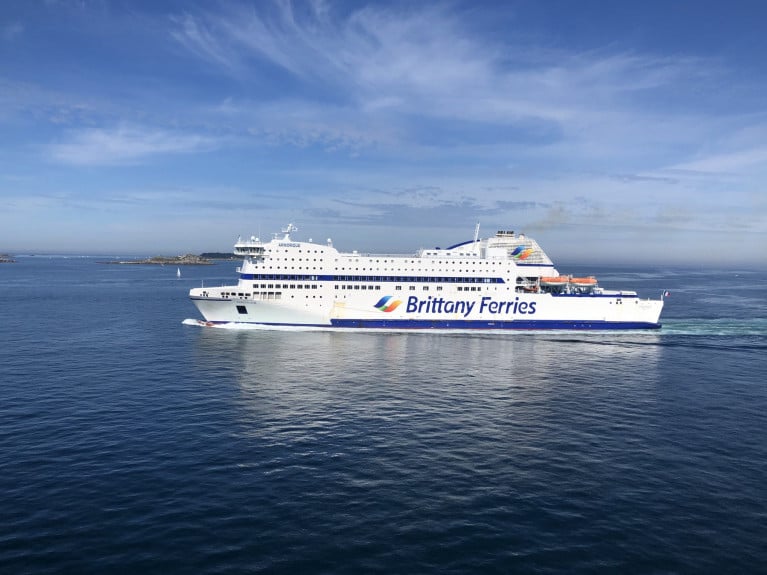With fallout of post-Brexit, demand from hauliers for direct ro-ro freight routes has led to 20 interventions by shipping companies notably between Ireland-France and another new route may be added to the fast-changing ferry scene, writes Jehan Ashmore.
According to Brittany Ferries, plans are in progress for a further freight route, this would involve connecting two Breton ports, Roscoff and St. Malo with Ireland. The aim of the French operator is to finalise schedules and begin operations as early as next month using Ro-Pax vessel Armorique (above) which Afloat adds operated the Cork-Roscoff 'seasonal' service while standing in for routine cruiseferry Pont-Aven in 2019 due to repairs required.
A growing number of haulage companies are shipping goods using unaccompanied trailers. Brittany Ferries says demand is rising, and the ports it serves on the western English Channel in France, the UK and Ireland are set-up to receive these loads. It believes more companies will look west in the months to come, and it has urged hauliers and logistics companies to get in touch.
“Things like negative Covid tests for drivers are certainly helping drive the trend for unaccompanied loads,” commented Simon Wagstaff Brittany Ferries freight director. “However, there are other financial benefits in going driverless. We know of one large haulage operation in Ireland, for example, that has organised reciprocal arrangements with another in Spain, dropping off and picking up trailers for each other. That’s a cost-effective way of doing business.”
In 2018 Brittany Ferries launched the first ever direct Ireland-Spain route, Cork-Santander, however Afloat adds the link was abandoned in favour of switching both Irish and Spanish ports. This led to another new Ireland-Iberian link, the Rosslare Europort-Bilbao route (launched almost a year ago) that predominantly serves freight traffic.
Just 10 days ago, Brittany brought forward the opening of another service out of Rosslare to Cherbourg, initially operated by Cap Finistere (see Afloat photo caption yesterday) however in mid-February to be replaced by ro-pax Connamara which launched the Cork-Santander route and followed by the Kerry.
The earlier than scheduled launch of the new Wexford-Normandy connection is to enable Irish, French and Spanish hauliers seek an alternative to the UK land-bridge, with the cost, time and administrative burden that this now brings.
In a normal non-Covid year, the French operator handles around 210,000 freight units using a twelve-strong ferry fleet which also operates on the English Channel and Bay of Biscay. The ferries serve Caen, Cherbourg, Le Havre, St. Malo and Roscoff in France, Portsmouth, Poole and Plymouth in the UK, Santander and Bilbao in Spain.
The Irish ports used by Brittany Ferries, saw Cork first served in 1978 to open the Roscoff route and last year's debut out of Rosslare 'Europort', where the south-east port (in 1990 was 'branded' given its suffix) is currently very much centre-stage.


























































